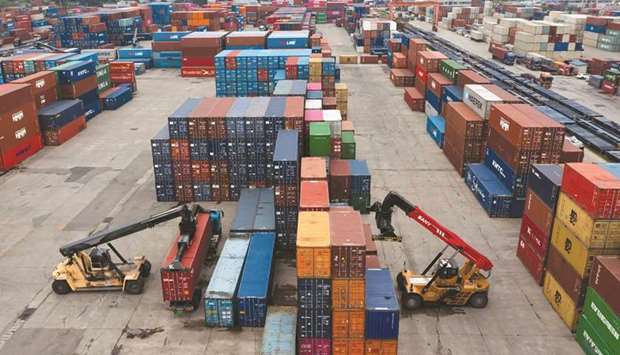South Korea raised its economic forecast for this year by a wide margin on expectations for record exports and a rebound in consumption as vaccination levels rise.
The country’s gross domestic product is expected to grow 4.2% this year, a full percentage point higher than the previous projection at the end of last year, the finance ministry said in its bi-annual policy outlook. Inflation will probably reach 1.8%, the ministry said, up from its earlier expectation of 1.1%.
The government’s forecasts are more optimistic than the central bank’s, as the expected spending from an upcoming extra budget was reflected. The ministry sees employment rising by 250,000 this year, while the Bank of Korea sees just over a half of that.
The economy already surpassed its pre-pandemic size earlier this year as exports jumped amid a reopening of major economies and fuelled investment at home. Still, the government took note of the growth trajectory – or muti-year average growth rates – which remain below that seen before the pandemic, and wants to keep fiscal stimulus flowing.
The government expects shipments to jump 18.5% this year to an annual record of $607.5bn. The pace of gains will ease after peaking in the current quarter. Consumption will also recover, though will trail pre-pandemic levels with a gain of 2.8% as international travel remains limited.
The economy would get a further boost if another extra budget under draft by the government is approved. Finance Minister Hong Nam-ki said last week it would likely exceed 30tn won ($26.5bn), marking one of the biggest stimulus packages since the pandemic hit.
The proposal will be submitted to the parliament in early July.
The government aims to use the extra funds to facilitate a consumption recovery, including issuing various discount coupons and offering cashback on credit card spending.
It also plans to create more than 150,000 jobs, and extend employment benefits to tourism and other services sectors that are still struggling.
“The government will try to ensure that consumption capacity accumulated during the pandemic is unleashed toward sectors that have suffered the most from the virus,” Vice Finance Minister Lee Eog-weon said in a briefing.
President Moon Jae-in has called for expansionary fiscal spending through next year to ensure that the benefits of an economic rebound are evenly distributed. Growth and inflation are expected to slow to 3% and 1.4%, respectively, in 2022, the ministry said.
That would put the average growth rate for 2020-2022 at 2.1%, below the 2.8% of 2017-2019, the statement showed.
The ministry said monetary policy needs to remain accommodative while also paying more attention to financial stability, in line with the central bank’s latest stance.
The Bank of Korea has been sending strong signals that it will start raising rates this year, citing growing risks of asset bubbles from pandemic-era easing. Governor Lee Ju-yeol on June 24 said a couple of hikes would still leave policy accommodative, and added fiscal spending can offer cover for people that would be most vulnerable to higher rates.

Reach stackers transport containers at the Uiwang Inland Container Depot. South Korea raised its economic forecast for this year by a wide margin on expectations for record exports and a rebound in consumption as vaccination levels rise.
